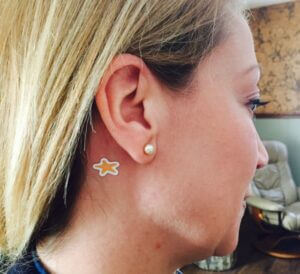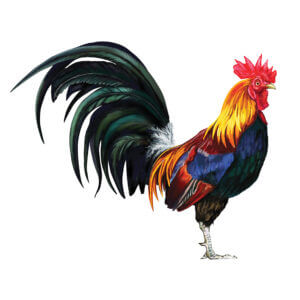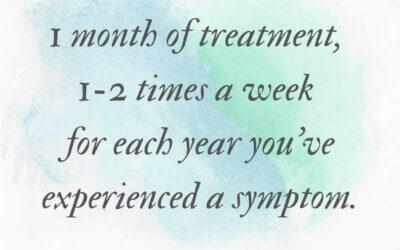As someone who is prone to motion sickness, I can’t help but make the following comparison: on a global, national, community and personal level, 2016 left me feeling dizzy and nauseated. As the Chinese New Year approaches, I’m ready to release that white-knuckled grip that kept me hanging on to the roller coaster of 2016. Are you?
The Chinese New Year is upon us and is based on the lunar calendar cycle, which repeats every 12 years. Each year is associated with one of twelve zodiac animals and one of the five elements (wood, fire earth, metal or water). Based on the Chinese lunar calendar, 2016 was the year of the Fire Monkey: a very yang year characterized by impulsiveness, unpredictability, expansiveness and chaos. The last time the fire monkey occurred was in the year 1956 which is when the Suez Canal Crisis occurred as well as the start of the Cuban revolution.
Are you ready for the Year of the Fire Rooster? Every year in January, I anxiously wait for the clear and concise synopsis that is offered up by Karen Abler Carrasco from the Western School of Feng Shui in San Francisco. Her summary of what to expect any given year based on the Chinese lunar cycle is concise and easy to digest. And why not keep things simple this year, shall we?
Welcome to the paradoxes of the Yin Fire Rooster Year, 2017. It will be a year of plummeting inward (yin rooster) while expanding outward (fire element) at the same time….Suddenly, in the midst of all the new explorations and projects into which the curious, insatiable Yang Fire Monkey year of 2016 lured us, we find ourselves getting bogged down with the mechanics of daily life. The forward momentum stutters and slows; our questing attention is corralled by the mundane. The people around us seem to press in on our sensations more keenly, their opinions feel more strident. Making and keeping appointments requires more effort. Even just getting food and preparing it seems to take more time and be more worrisome.
Yet, we are also more touched by the small everyday kindnesses we witness, and there is a growing, unifying wave of togetherness. If you pay closer attention this year, you will actually feel your tender heart expanding, growing more confident in making little overtures of love to everyone around you.
The rooster wakes us up at the crack of dawn. And while you may be tempted to hit snooze, this is a call to action. If you’re going to heed the call, you have to be well rested, no?
We consider a good night’s sleep to be the first line of defense when it comes to your health. A chronic lack of sleep can increase your chances of developing heart disease, slow down brain functioning, make it difficult to lose excess weight, lower your immunity, and increase depression and anxiety among other things. Without a good night’s sleep, all bets are off.
Issues with sleep can have to do with lifestyle choices, imbalances in your body, or a little of both. By becoming aware of some lifestyle issues that might be affecting your sleep, you can take your health into your own hands and change your pattern.
1) Power down: TV. Phone. Computer. iPad.
Touchy subject, I understand. Rather than simply telling you WHAT to do, I want you to understand the WHY part…especially when it comes to disconnecting from technology, which we’re all influenced by to some degree. Harvard Medical School is among many who have summarized the research: the “blue light” that emanates from these electronics passes through the retina and into the hypothalamus, which is an area of our brain that controls many of our sleep activities. This delays the release of the sleep hormone melatonin, which then disrupts our natural sleep cycle. This same hormone-release and circadian rhythm cycle is what drives the rooster to crow predictably every morning (unless, of course, he’s been up late watching Game of Thrones).
But wait, there’s more.
Watching television or responding to emails stimulates the firing of neurons and electrical activity in our brain. We become accustomed to the stress response that can occur from watching a dramatic show or the evening news….to the point that it doesn’t even register as stress. Nevertheless, a hormone called cortisol is released into our blood stream which stimulates the fight or flight response in our body, making it especially hard to wind down and fall into a restful sleep.
As a recovering late-night TV binge-watcher, I was surprised to discover that the quality of my sleep was becoming affected by the shows I was watching. I used to be able to watch shows like Breaking Bad and The Wire with little repercussion….until all of a sudden, I couldn’t. I was mid-way through Season 2 of True Blood when I had to pull the plug on evening TV altogether. It’s impossible to wake feeling rested after being chased by vampire metaphors in my dreams all night long. Now, if I didn’t have a 6-year-old or a job and could binge watch epic fantasy series such as Game of Thrones during the daytime, I would be a certified couch potato.
2) Ritual
There is power in rituals, which is why we engage in them on a daily basis with activities such as brushing our teeth twice a day or sitting down for family dinner. Thoughts become actions, actions turn into habits, our habits become our character and our character determines our destiny. You are destined to a well-rested life!
If you don’t have an evening ritual or you want to change the one you have, start by thinking about what that might look like. Some ideas…. tea, reading, changing into PJs, creative activities, meditation, journaling, preparing lunch for the next day, or gentle stretching. Certainly, this will look different for everyone.
My mentor in California, Dr. Robert Johns, would always advise his patients to engage in activities that involve deliberate, soft and repetitive movements with the hands, as this has a calming effect on the heart. Movements involved in the process of painting, playing an instrument, knitting, doodling or tinkering can help calm your nervous system. By the way, texting or typing do not qualify. Not the same. Let me be clear: no artistic background is required! This is about the process, not the product. At night, Jorge likes to play his guitar and I love to paint. These activities are soothing, and since we do them pretty consistently in the evenings, they cue our bodies that the time for sleep is drawing near.
3) Acupressure
 Locate the divot directly behind your earlobe. Now move your finger about one inch towards the back of your neck. You’ve found the acupuncture point called An Mian, which translates to “Peaceful Sleep.” Massage this point on both sides of your head for a few minutes in the evening to calm the spirit and promote restful sleep. You can also do this if you wake up at night and have difficulty falling back asleep.
Locate the divot directly behind your earlobe. Now move your finger about one inch towards the back of your neck. You’ve found the acupuncture point called An Mian, which translates to “Peaceful Sleep.” Massage this point on both sides of your head for a few minutes in the evening to calm the spirit and promote restful sleep. You can also do this if you wake up at night and have difficulty falling back asleep.
4) Acupuncture & Herbal Medicine
If you’ve made these lifestyle changes and sleep continues to pass you by, there may be an imbalance in your constitution that can be adjusted using acupuncture and herbs. Since there is no such thing as a protocol for insomnia or restless sleep in Chinese medicine, we spend a lot of time mining for specifics about your unique sleep patterns (or lack thereof).
-
- Do you have difficulty falling asleep?
- Do you have difficulty staying asleep?
- How long does it take you to fall back to sleep at night if you wake up?
- What does your body temperature feel like when you wake up at night?
- How often are you waking at night to use the restroom?
- Do you dream vividly? Or at all?
- Do you feel rested when you wake up in the morning?
The answers to these questions combined with what we can learn about you from looking at your tongue and taking your pulse will help us determine which acupuncture points and herbs will be effective in helping you move towards a good night’s sleep.
The Year of the Rooster emphasizes refinement….of our boundaries, our support systems and our health. We are honored to be able to support you on your health journey. If a lack of sleep is weighing you down, don’t fret. We’re here to help restore your cockadoodle doo.
That’s all. Good night.









